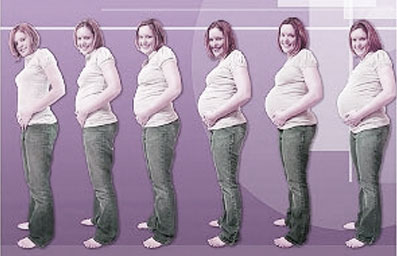
In your pregnancy, you are now in week 3. About 2 weeks before your next expected menstrual period (at the beginning of this week), the amount of estrogen in your body increases dramatically and then drops. This triggers your pituitary gland to release a surge of luteinizing hormone (LH), prompting one of your ovaries to release a ripened egg (ovum). The egg moves down into the fallopian tube towards your uterus, with the help of muscular contractions and millions of hair-like cilia; to wait for one lucky sperm to penetrate it. Sometime between 12-48 hours after you ovulate, one sperm will break through the outer layers of the ovum and complete conception. Now, you are officially pregnant! This is also the moment when the gender of your baby is determined.
The ball of cells divide and multiply, as it travels down the fallopian tube to your uterus. After about a 7-10 day journey, the fertilized egg arrives and briefly floats freely in your uterus, as it continues it’s growth and development. It then attaches to the wall of your uterus and implants into the lining.
Occasionally, when the fertilized egg implants itself into the uterine wall, women may experience a small amount of spotting. Implantation bleeding typically occurs just before or at the same time you would normally expect your period to begin, but it’s less heavy than a regular menstrual period and a different shade, usually pinkish or brown.
You need to eat good food to keep both you and your tiny growing baby healthy. Your baby’s health at birth is closely tied to what your diet is like right now. Make sure you get plenty of fruits and vegetables, as well as foods that contain calcium and protein. Try to avoid junk foods, such as those that have been fried and those that are full of sugar.
If you’ve already had a few alcoholic drinks during your pregnancy, don’t worry about it, but don’t continue to consume alcohol. It’s best not to drink any alcohol during pregnancy at all; even when you’re planning to become pregnant. Alcohol affects how your baby’s brain and body develop, because when you drink, alcohol reaches your baby very fast and just a few drinks can lead to a condition called fetal alcohol syndrome (FAS). The brain of a baby with FAS may work more slowly than the brain of a healthy baby and also they may have severe heart problems.
